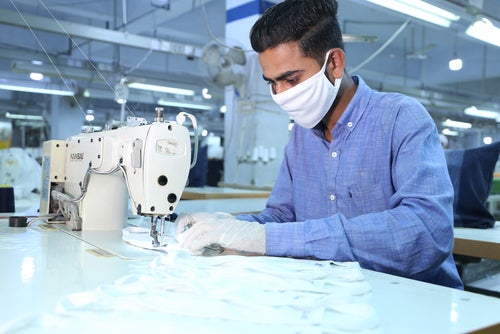
The announcement that the International Safety Accord was extending its efforts into Pakistan after nine years of operating in the garment sector in Bangladesh was made by UNI Global Union and IndustriALL Global Union.
Signatories to the International Accord for Health and Safety in the Textile and Garment Industry are establishing a comprehensive workplace health and safety programme in Pakistan covering signatories’ garment and textile suppliers. The new Pakistan Accord on Health and Safety in the Textile and Garment Industry is a legally binding agreement between global union federations, UNI Global Union and IndustriALL Global Union, and garment brands and retailers for an interim term three years starting in 2023.
Building on widespread safety improvements in Bangladesh, the Pakistan Accord includes all key International Accord features: independent safety inspections to address identified fire, electrical, structural and boiler hazards, monitoring and supporting remediation, Safety Committee training and worker safety awareness programme, an independent complaints mechanism, a commitment to broad transparency, and local capacity-building to enhance a culture of health and safety in the industry.
“We are committed to working closely with Pakistani stakeholders to ensure our collective efforts are beneficial to the industry and its workers,” said Joris Oldenziel, executive director, International Accord Foundation.
The successful experience in Bangladesh prompted the signatories to expand the workplace safety programme to at least one other textile and garment-producing country. Through signatory surveys, extensive research, and local stakeholder consultations, the Accord Secretariat assessed the feasibility of expanding based on key factors. Pakistan emerged as a priority country, in part because of its importance as a garment and textile sourcing country for the Accord brands.
The International Accord has undertaken extensive engagement in Pakistan with federal ministries and provincial governments, industry associations, suppliers, trade unions and civil society organisations. The Pakistan Accord programs will be implemented in phases, in close collaboration with these key stakeholders and through the establishment of a national governance body.
The Pakistan Accord covers Cut-Make-Trim (CMT) facilities, namely Ready-Made Garment (RMG), home textile, fabric and knit accessories suppliers (including vertically integrated facilities). Fabric mills within the supply chains of the signatories are also covered, with implementation scheduled for a later stage in the program. The programme aims to incrementally cover more than 500 factories producing for more than 100 Accord signatory companies throughout the Sindh and Punjab provinces, where most of Pakistan’s US$20bn in garment and textile exports are manufactured annually.
All current signatories of the International Accord which are sourcing from Pakistan are expected to also sign the Pakistan Accord.
The decision to expand to Pakistan was announced during a signatory brand caucus meeting held on 14 December 2022. Brands will receive an information package on the Pakistan Accord and will be invited to sign from 16 January 2023.
“It has long been our goal to expand the successful model established in Bangladesh to other countries. With the Pakistan Accord, we will improve safety and save lives and increase our reach from the garment sector to home textiles and accessories. International retailers and brands that source from Pakistan who want to be committed to safety should sign up and take responsibility for the workers in their supply chains,” says UNI Global Union General Secretary, Christy Hoffman.
Atle Høie, general secretary, IndustriALL Global Union, adds: “We have managed to successfully expand the Accord to a second country. Pakistani garment workers will now face a safer future in their workplaces – preventable deaths and accidents will rapidly decrease as the programme is implemented, workers will receive training on occupational health and safety, which will empower them and hopefully they will see the benefit of joining a trade union to fight collectively for their rights.”
It followed a spate of reported safety incidents at factories across the country.
Campaign groups have welcomed the news of the launch of the Accord in Pakistan.
Nasir Mansoor, general secretary of the National Trade Union Federation Pakistan, said: “After years of fighting for the expansion of the Accord to Pakistan, our workers can finally be brought under its monitoring and complaint mechanisms. If enough brands sign, workers will not have to fear for their lives when going to work and will know who to appeal to when their factory is unsafe. The strength of the Accord is in the fact that unions have equal power to corporations in its decision-making.”
Zehra Khan, general secretary of the Home-Based Women Workers’ Federation, said: “The Accord programme will bring inspections, safety trainings, and a complaint mechanism covering all health and safety issues, including gender-based violence, to workers in Pakistan producing for signatory brands. Particular attention will be needed to ensure that women workers, who are often not officially registered and might be working from home, have the same access to this programme as other workers.”
“We are heartened that the groundbreaking Accord programme will now come to Pakistan, where it is urgently needed. All brands sourcing from Pakistan should embrace this agreement,” said Ineke Zeldenrust, international coordinator of the Clean Clothes Campaign. “It is important to note that garment and textile workers in Pakistan had to wait a decade for this progress. We hope workers in other key garment producing countries won’t have to wait as long.”
Scott Nova, executive director of the Worker Rights Consortium, said: “The hallmarks of the Pakistan Accord are accountability, enforceability, and transparency. Under this new agreement, Pakistan will become one of the safest places in the world to make clothes.”
The International Accord on Health and Safety came into being in 2013 in direct response to the Rana Plaza collapse in Bangladesh.



